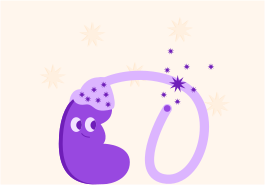YOU ARE LEARNING:
Glucagon

Glucagon
Glucagon is a hormone produced by the pancreas that acts to increase a low blood glucose level.
Glucose taken into the blood from digestion is a vital chemical for life. What do we call the process that our cells use glucose for?

The body tries to maintain a constant leave of glucose in the blood. If there is too much glucose in the blood, the cell could dehydrate and die. If there is too little glucose in the blood, the body will have too little energy for respiration and life.
When the blood glucose levels are too high, the pancreas secretes insulin. This makes the cells take up excess glucose. The pancreas is an endocrine gland. What do we call the group of chemicals secreted from these glands?

This excess glucose is stored as glycogen in two organs. Which two?

You can select multiple answers
When the blood's glucose levels drop below normal, the body needs to release these stores.
Which endocrine gland monitors the blood's glucose levels?

If the pancreas detects a drop in blood sugar levels, it secretes the hormone glucagon. Where does it secrete this into?

When the glucagon reaches the muscles and the liver, it makes these cells convert glycogen back into glucose.
This glucose is released back into the blood to help increase the blood sugar levels.
Insulin and glucagon work together to maintain the optimum level of glucose in the blood.
If someone is hypoglycemic this means they have low blood sugar.

In this situation which hormone is the pancreas secreting?


Glucagon will increase the blood sugar level. Which hormone will be produced when the level returns to normal?
A) Glucagon B) Insulin C) neither


If the person becomes hyperglycemic is it glucagon that gets secreted?

This balancing act between insulin and glucagon to keep the blood sugar levels correct is an example of a negative feedback cycle. In other words, if the condition changes, something happens to bring it back to normal.
Riding a bike at a constant speed is an example of a negative feedback cycle. If you go up hill, you slow down, so you peddle faster to keep your speed up. You go down hill, you go faster, so what do you...

There are other examples of negative feedback cycles in the body. They form part of the body's efforts to keep a constant internal environment that is optimum for life. We call this ability of the body to keep conditions constant homeostasis.
